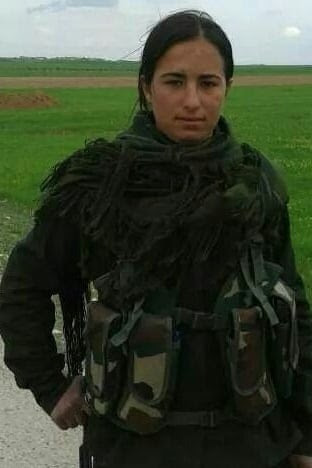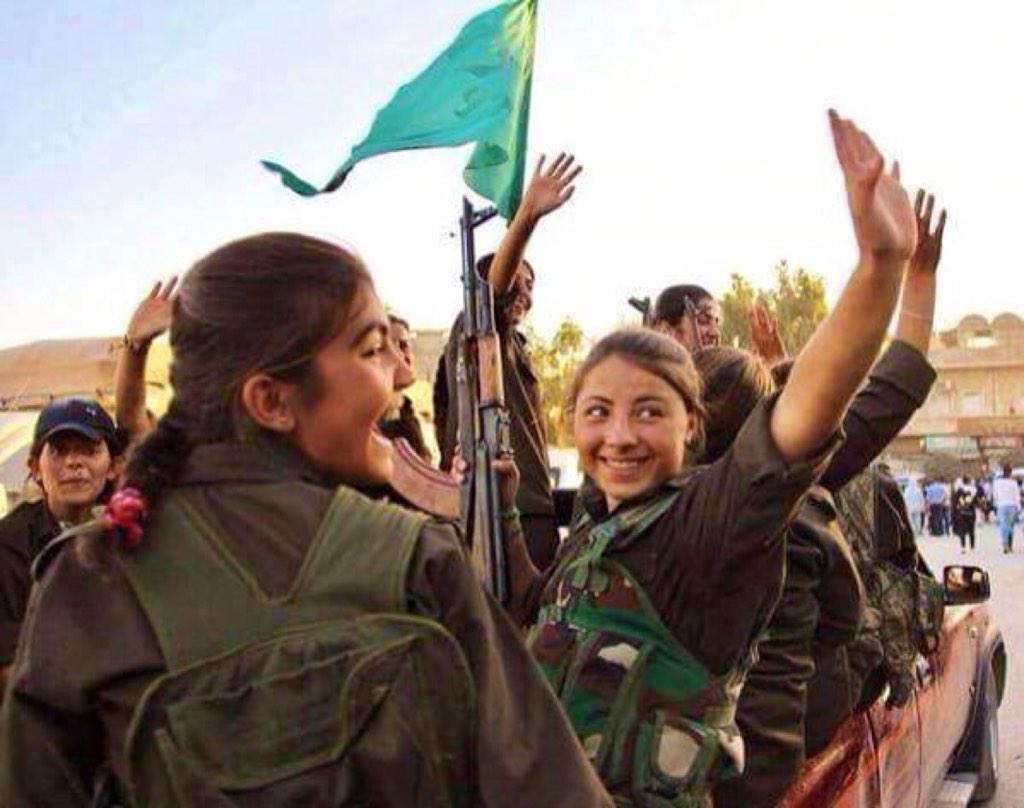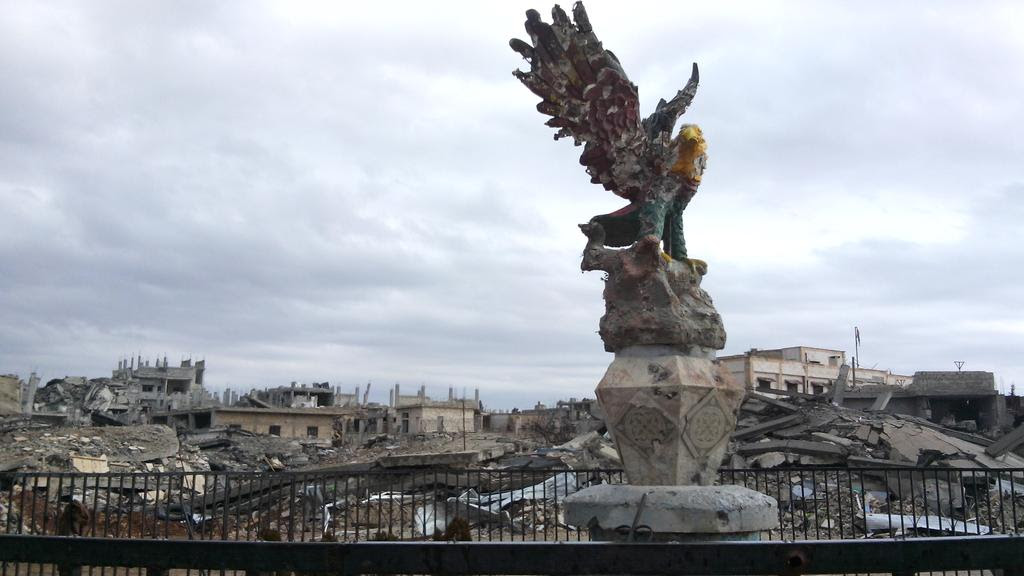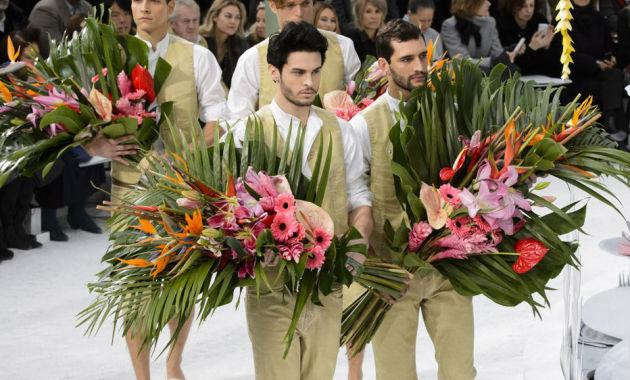.
#YPG and #YPJ liberate many villages around #Kobani: image via Sherzad Ali #Kurd @SheroHalibaz, 30 January 2015

Kurdish people hold a picture of dead fighter during a celebration rally near the Turkish-Syrian border at Suruç on Tuesday: photo by Bulent Kilic/AFP via the Guardian, 30 January 2015
'We
are so proud'-- the women who died defending Kobani against Isis: This
week Kurdish forces took full control of Kobani, a Syrian town
near the Turkish border, after months of bombardment by Islamic State.
Mona Mahmood speaks to four Kurdish families about the female fighters
who died helping to wrest control of the town from Isis: Mona Mahmood via The Guardian, 30 January 2015
Shireen Taher

Shireen Taher had hoped to study English literature at university: photo by The Guardian, 30 January 2015
Mustafa Taher, 30, a lawyer and Kurdish language teacher, on his sister
A few months after the revolution in Syria broke out, the Syrian
regime permitted predominantly Kurdish towns in Syria to teach the
Kurdish language in their schools. This included my home town, Kobani.
My sister Shireen, then 19, was supposed to study English literature at
Damascus University in autumn 2012, but it became inconceivable to
travel between Kobani and the capital given the increase in violence
throughout Syria. Shireen instead studied the Kurdish language in Kobani while waiting for the chance to join the university.
Of my 11 brothers and sisters, I was closest to Shireen. We were more
like friends than sister and brother. She was sensitive, fond of
parties and loved sport. We were great fans of Barcelona football team.
When the World Cup final was held in Johannesburg in 2010, Shireen
travelled to Damascus where I worked as a lawyer, so we could watch the
matches which were screened in large parks.
Shireen was inspired by her female Kurdish language teacher, Vian,
29, a fighter with the Kurdistan Workers’ party, PKK. It was a sombre
day for the locals of Kobani when Vian was killed in a fight against
Jabhat al-Nusra, the al-Qaida affiliate and Syrian jihadi rebel group,
in the Syrian town of Tel Abyad on 26 July 2012. At the funeral in
Kobani to extol Vian’s martyrdom, my father gave his old gun to Shireen
and told her to follow her teacher and be a fighter –- despite my
mother’s disagreement. Shireen vowed to join the People’s Protection
units, YPG, to seek revenge for her teacher and defend Kobani. If
Shireen had not volunteered, I would have done.
Shortly afterwards, the Islamic State of Iraq and Syria (Isis)
launched attacks against Kobani. They were initiated by a car bomb at
the Red Crescent centre on 11 November 2012. My father, 67, and his
friend were nearby and were killed, alongside 12 other martyrs. During
my father’s funeral, Shireen said: “I always thought that one day my
father would be named as the father of martyrs, but I never thought that
I would become the daughter of a martyr.”
Our father’s death gave Shireen an enormous jolt to adhere to his
will and be an outstanding fighter. Especially after we went to the
mortuary for his body. It was hard to identify given the massive damage
caused by the explosion. Shireen was devastated by the martyrdom of
several of her friends. She could hardly cope with the loss of her
father and teacher. Life became meaningless for Shireen. She would spend
days training in the military camp on weapons like the Kalashnikov,
rocket-propelled grenades and hand grenades.
During her two years of training, Shireen would visit us. I could not
believe how much her personality changed during her long embedding in
the military camp in a Kobani suburb. She used to have a Barcelona flag
around her neck and wore full makeup. I can’t remember her hands without
rings or bracelets. Her bag, which was full of perfume and cosmetics,
came to be loaded with bombs and bullets.
The day I decided to move my mother and sisters to Turkey, like most
of the locals of Kobani, to escape the hellish Isis attack against our
town, my mother insisted that I call Shireen. She told my mother: “If
you leave Kobani, you won’t be my mother any longer.” But after three
days, Shireen asked my mother to leave as soon as possible as Isis was
getting closer to the city.
A group of Free Syrian Army fighters
walk by destroyed stores in northern Kobani near the border crossing,
December 15: photo by Mohammed A. Salih via All Monitor/Iraq Pulse, 23 December 2014
Shireen was camping west of Kobani when Isis militants were pushing
forward towards the city with their heavy weapons and tanks. The Kurdish
resistance was able to distract the progress of Isis with their light
weapons but they could not stop it forever. Shireen was hiding in a
trench near the Kurdish radio broadcast office. I rang her from Turkey
five hours before her martyrdom to check on her. She said: “Do not
worry, I’m still alive.” At 8pm, my other sister –- who had stayed in
Kobani working in the hospital as a nurse – called Shireen out of her
fear for her safety. Shireen asked her not to contact her any more as
the fight was getting worse and she could no longer speak on her mobile.
When my mother answered, the man told her to come and get her daughter’s head.
Then we heard about a heavy fight launched by Isis against Kobani. At
10pm, we got a call from my sister’s mobile. It was a man’s voice. He
asked if he was speaking to Shireen’s family. One of my sisters
confirmed that we were, and he told her that Shireen was killed by Isis
and she needed to collect Shireen’s head.
Before my sister could break the news of Shireen’s martyrdom to my
mother, the Isis militant contacted my mother in Turkey and told her
Shireen wanted to speak to her.
When my mother answered, the man told
her to come and get her daughter’s head. My mother lost consciousness ,
and was taken to hospital.
We called Shireen’s friends at the war front, who said Shireen and
five other female fighters were ambushed on 30 September by an Isis tank
that shelled them all to death. I returned to Kobani to get Shireen’s
body for her funeral, but her friends told me her body was still with
Isis and no one was able to go into the district where she had been
killed. I returned to Turkey with my sister – she had a nervous
breakdown and could not stay in Kobani any more.
Although Shireen’s martyrdom was heartbreaking for my family, we are
all proud of her sacrifice and the sacrifice of all her friends killed
defending Kobani.

FIGHTING TERRORISM FOR THE WORLD #Kobane #YPG @KurdisCat #shahedbaz: image via Leila Peterson @leila53233, 30 January 2015
Hameera Muhammed

Hameera Muhammed: photo by The Guardian, 30 January 2015
Muhammed Khashman, 45, a businessman who is a refugee in Turkey, remembers his sister’s adopted daughter, Hameera Muhammed
Hameera was born three months after her father was killed in a car
accident in 1982. It was difficult for her mother to cope with the
expense of four children on her own. My sister, a friend of Hameera’s
mother, offered to adopt the baby and raise her with her eight children
in Kobani. Hameera was cheerful with a sense of humour, and married a
taxi driver from Kobani when she was 18.
On a trip to Aleppo two years ago, Hameera’s husband was killed by a
sniper while she was giving birth to their youngest son. It took Hameera
three days to get her husband’s body back to Kobani as a result of
heavy fighting between the Syrian army and the rebels in Aleppo. It was
hard for Hameera to cope with the expense of her five kids. She relied
only on selling dairy products from a cow that had been owned by her
husband and on subsidies from her parents. Her father-in-law offered
Hameera and her children a room in his house but she refused to leave
her home. After a series of quarrels, her father-in-law took Hameera’s
five kids to his house and she went to live with her parents.
Hameera was devastated by the loss of her kids. She wanted to see her
baby to breastfeed him but she was not allowed. All of Hameera’s
mother’s attempts to repair the rift between her and her father-in-law
did not work. Hameera’s depression and her yearning to be reunited with
her kids became obvious. When the fight escalated in Kobani between Isis
and Kobani’s fighters last September, Hameera’s family was one of
thousands who crossed the border into Turkey. Driven by fear and horror,
Hameera’s mother was unable to check whether she had all her nine
children with her. It was only when she reached the refugee camp in
Turkey that her eldest daughter told her Hameera had stayed in Kobani to
fight Isis, and that she had joined the resistance.
After
a week, Hameera contacted her mother asking for forgiveness. She said
he thought joining the resistance in Kobani to fight against Isis would
make her father-in-law treat her differently and let her see her
children. She told her mother she had been wounded in her shoulder and
hand during a fight against Isis. Hameera’s mother pleaded with her to
come to Turkey. She said she was not well trained, that the war is not a
joke and that it is for men not women.
It was the first day of observing Eid al-Adha in Turkey, so I visited
my sister in the camp to check on her and her family. They were on the
phone to Hameera, who told them she was getting better but she missed
them and her kids. Hameera’s mother asked her to come back as the fight
was getting tougher and she was worried about her. Hameera’s answer was
that she wouldn’t be able to speak on the phone any more.
Ten days later, Hameera’s sister got a phone call from someone who
said Hameera had been hiding in a building with a few other fighters
when a mortar had shelled the building and killed them. The building was
still occupied by Isis and Hameera’s body with others were inside.
Hameera’s mother insisted on giving her a funeral in the camp as a
martyr. She hopes she will get Hameera’s body back so she can bury her
in Kobani and her kids can visit her.

Wreckage left by fighting on a street in the centre of Kobani: photo by Bulent Kilic/AFP via the Guardian, 30 January 2015
Garbage

London, UK. Members of staff carry a painting by Paul Cézanne titled Vue sur L’Estaque et le Château d’If, which is estimated at £8-12m, during the impressionist, modern and surreal art preview at Christie’s auction house: photo by Ben Stansall/AFP via The Guardian, 30 January 2015

Liaoning, China. A woman picks up recyclable materials, as seagulls look for food, at a garbage disposal plant in Dalian: photo by Reuters via the Guardian, 30 January 2015

Shanghai, China. A worker passes an advertisement in the city: photo by Johannes Eisele/AFP via the Guardian, 30 January 2015

Weegee, 1940, by Red Grooms, features in the Wadsworth Atheneum’s new exhibition – Coney Island: Visions of an American Dreamland, 1861-2008: photo by Wadsworth Atheneum via the Guardian, 30 January 2014
Victory

FIGHTING TERRORISM FOR THE WORLD #Kobane #YPG @KurdisCat #shahedbaz: image via Leila Peterson @leila53233, 30 January 2015

#Kurdish women have defeated #ISIS & thrown them out of #Kobani ...? #Beauty #Brains #Bravery #ISIS Blessed #SaffronGirl, Varsha Singh, Ms. Moon Beam and 7 others: image via Dr Jwala Gurunath @DrJwalaG, 30 January 2015
Heroines of #Kobani transformed narrative of resistance against ISIS. They defend homeland, international help vital: image via Barham Salih @BarhamSalih, 26 January 2015

#Kurdish women have defeated #ISIS & thrown them out of #Kobani ...? #Beauty #Brains #Bravery #ISIS Blessed #SaffronGirl, Varsha Singh, Ms. Moon Beam and 7 others: image via Dr Jwala Gurunath @DrJwalaG, 30 January 2015

Kurds 'take full control' of #Kobani from Islamic State - #c4news: image via Channel 4 News @Channel4News, 26 January 2015

#Kurdish women have defeated #ISIS & thrown them out of #Kobani ...? #Beauty #Brains #Bravery #ISIS Blessed #SaffronGirl, Varsha Singh, Ms. Moon Beam and 7 others: image via Dr Jwala Gurunath @DrJwalaG, 30 January 2015
the freedom square bird is on its feet in the middle of all the destruction, #kobani: image via Frederike Geerdink @fgeerdink, 30 January 2015
Fashion Week

Copenhagen, Denmark. Models blow glitter into the audience during Copenhagen Fashion Week: photo by Simon Laessoe/AFP via The Guardian, 28 January 2015

A model walks the runway during the Franck Sorbier show at Paris Fashion Week: photo by Bertrand Rindoff via The Guardian, 28 January 2015

Paris fashion week: the catwalk at Julien Fournié: photo by Victor Boyko via The Guardian, 28 January 2015
Berivan Fadhil

A young peshmerga female fighter still patrols Kobani's empty streets: photo by Anadolu Agency via The Guardian, 29 January 2015
Ibrahiem Fadhil, 46, a shopkeeper and now a refugee in Turkey, recalls his sister
Berivan was a 22-year-old ordinary, smart, ambitious girl, trying to
find her way in a wildly violent place like Syria. I never thought I
would see the day when Berivan would be holding a gun to defend her town
Kobani to her last drop of blood. Scenes of horror and brutality in
Syria were highly affecting her. She could not sleep for a few nights
after she watched the Isis military campaign against the Yazidi minority
in Sinjar, and was frightened that Kobani would face the same fate.
Berivan said to her mother: “I’m going to join Kobani’s fighters and no
power on earth can stop me.”
Berivan was only two when her father was killed in a car accident in
Aleppo, leaving behind a family of seven kids without any support.
Despite the difficult circumstances, Berivan did really well in school,
with the aim of fulfilling her dream of joining a college of medicine.
It was only a few days before her final exam when the revolution broke
out in Syria.This meant that she was not able to travel to Aleppo to do
the test.
Berivan’s mother was terrified by the kidnapping of a number of
Kurdish students by Isis militants while they were on their way to do
the exam in Aleppo. It was a hard choice, but Berivan’s mother preferred
that if her daughter were to be killed, it should be in defence of
Kobani rather than from a kidnapping or murder by Isis. It would be a
more honourable death for the family.
We had to leave Aleppo two years ago to escape the heavy shelling of
the Syrian army planes that accompanied the clashes between factions and
devastated the life of the locals. Being at home most of the time,
Berivan’s dream of becoming a doctor was withering with the escalation
of violence in Syria. She spent most of her time listening and watching
news of the war in Syria and the rapid advance of Isis in Iraq.
We did not have many options. We headed to Riqa where we have a few
relatives, seeking refuge and protection. But it was not long before
Isis ravaged Riqa and turned it into its main base for the Islamic
state, where military campaigns are waged against its enemies including
the Kurds. All the Kurds were a target for Isis, under the accusation of
being defectors and loyal to the Syrian regime.
There was no other escape but to go back to Kobani, which we did a
few months ago. The town was relatively secure under the control of the
Kurdish labour party, despite the shortage of water and power as a
result of the tough siege imposed by Isis on all entrances to the city.
Most food products and fuels were smuggled into Kobani, business was
dead, and we relied on our savings to maintain our life.
When the danger of Isis was creeping back towards the Kobani suburbs
six months ago, lots of Kurdish men and women volunteered to join the
Kurdish People’s Protection forces in preparation for a showdown. It was
the moment Berivan had been yearning for. She did not wait to get her
family’s approval and enrolled with the force. She embedded in military
camps for training on light weapons with her cousins and friends. The
military camp was in the Kobani suburbs and Berivan could only come home
once a week. I used to go and see her in the camp when she could not
make it home. I could see that she was mainly talking about politics and
human rights abuses. She said she would not stand a second in Kobani
under the Isis command.
As a family we could not object to Berivan’s decision as most of the
young Kobani locals had left their schools or jobs to focus on training
for the protection of Kobani. It was a big relief for my mother that
Berivan stopped asking to go to Aleppo to do her final exam -- this put
an end to the ongoing nightmare of Isis kidnapping Berivan and selling
her as a slave, as they had done with Yazidi women. As a man with three
kids, I could not join in with the training out of fear for my kids’
future if I were to be killed.
In the eighth months Berivani spent in the military camp, I tried in
my visits to her to warn her of the risks of being killed as she was
young and not used to military life. But she would not let me finish.
Her morale was high and she would not reconsider.
Although we were swamped with fear and worry about Berivan getting
killed in a fight, she was still haunted by the dream of completing her
studies. She used to spend long hours reviewing her school books when
she was allowed home. But the security situation deterioration rapidly.
Isis increased the intensity of their attacks against Kobani villages
with mortars, artillery and car bombs.
Most of the villagers ran to the centre of Kobani, fearing Isis
attacks. We were worried about our family and about the kids who were
terrified by the mortars that would fall randomly on the city. I rang
Berivan to say: “We are all leaving to Turkey, what are you going to
do?” She replied: “I’m not coming with you, it has become a matter of
life and death to defend Kobani.”
We became really worried on 18 October. Berivan’s mobile had been
switched off for days. It was difficult to reach the military camp or to
know where, until my mobile rang. It was Berivan’s friend. He said:
“I’m sorry to let you know that Berivan was killed by a car bomb as she
was advancing towards Isis positions.”
I’m
so proud of her martyrdom –- I refuse to get consolation for her loss
and would rather be congratulated for her heroic death.
Fighters and civilians bury the bodies of three civilians after an IS mortar attack on Kobani on December 16, The civilians were killed by the type of IS-fired
mortars that regularly fall in and around YPG-controlled areas. That
morning, a father, his son and their neighbor became victims. The
father, Ahmed Abud, was an Arab man married to a Kurdish woman. After IS
overran his village, he had sought refuge in Kobani. He is survived in
Kobani by his wife and a daughter. "He was a very good man. We used to help each other in moments of
need," said Abu Yasin, one of Abud's neighbors. "He wanted to go back to
his village once it was liberated.": photo by Mohammed A. Salih via Al Monitor/Iraq Pulse, 23 December 2014
Chanel

Chanel at Paris fashion week: photo by Gonzalo Fuentes/Reuters via The Guardian, 28 January 2015

Chanel Threw a Magical Garden Party for Its Couture Show #FashionWeek: image via Michelle Cook @michelleeetco, 27 January 2015
So Pretty!! ThankU^^ "#CHANEL #itschanelhautecouturebaby" @xxxibgdrgn's Insta Video: image via Rika F. @solysombra0518, 27 January 2015

The bride with male bridesmaids at Chanel: photo by Rindoff/Dufour via The Guardian, 28 January 2015
There's a LOT going on with this #Chanel dress: image via stuart emmrich @StuartEmmrichNY, 27 January 2015
Oh to be at the @Chanel Couture show! #fashion #chanel: image via B Public Relations @BPRsocial, 29 January 2015
Take a tour of Karl Lagerfeld's #Chanel greenhouse: image via Grazia Live @Grazia_Live, 27 January 2015
Kristen Stewart to star in a @CHANEL campaign with Alice Dellal and Vanessa Paradis #Chanel: image via Grazia Live @Grazia_Live, 27 January 2015
Ruhan Hassan

Ruhan Hassan, right, with a fellow fighter in Kobani: photo by The Guardian, 30 January 2015
Adnan Hassan, 50, a refugee in Turkey, talks about his niece
Ruhan, 19, wanted to know more about the political rights of the
Kurdish people in Syria. She was keen to attend all the national
activities organised by the different political movements in Kobani. She
was the youngest child of a family with seven kids and limited
financial resources, and they could not afford to send her to the city
to complete her secondary schooling.
Ruhan read a lot about the Kurdish labour party leader, Abdullah
Öcalan, co-founder of the PKK, who has been in jail in Turkey for more
than 15 years. Ruhan was inspired by his books about Kurdish women and
their rights. She joined the women’s protection force in Kobani and in
2013. Ruhan proved to have good skills in fighting against the
terrorists, and she encouraged her cousin to join the fight too.
All the fighting forces in Kobani were on alert after the massive
attack launched by Isis against Kobani last September. Ruhan’s father
asked her to come home and leave the fight to men. She said she
preferred to be dead rather than live under the control of Isis and be
taken as a slave.
The situation was worsening in Kobani with the flooding in of more
Isis fighters. Ruhan’s family struggled to stay to be close to her, but
Isis militants started to shell the city centre. There was no way they
could stay in Kobani – even their Arab neighbours became a risk after
collaborating with Isis against the Kurds. Ruhan’s father told her she
needed to flee with them to Turkey. Ruhan said she had decided to die in
Kobani.
Like most of the Kurdish families in Turkey, Ruhan’s family watched
Kurdish TV to keep up with the news of the fighting and the names of
wounded and martyrs among the Kurdish fighters in Kobani.
Then the TV announcer read the names of the martyrs. Ruhan’s mother
jumped out of her chair when she heard Ruhan’s name. It was a terrible
and sad day. The family ran to the Turkish border to go back to Kobani
to find out what had happened to Ruhan. Getting back to Kobani was
impossible under the non-stop fight with Isis and the military siege
imposed by the Turkish police.
Ruhan’s father kept trying her cousin and other friends for any news
of his daughter. Her cousin said Ruhan had been at the western front of
Kobani with three other female fighters firing against Isis until they
ran out of ammunition. They did not want to be taken as prisoners by
Isis so they used their last hand grenades to kill themselves.
A mannequin in the ruins

Kobani, Syria. Musa a 25-year-old Kurdish marksman, stands on top of a building as he looks at the destroyed Syrian town. Kurdish forces recaptured the town on the Turkish frontier in a symbolic blow to the jihadists who have seized large swathes of territory in their onslaught across Syria and Iraq: photo by Bulent Kilic/AFP via The Guardian, 30 January 2015

Visited #Kobani today. The city was shattered, residents will need lot of assistance to reconstruct it. Story coming.: image via Ayla Albayrak @aylushka_a, 28 January 2015

A mannequin is pictured amongst the debris of a street in Kobani: photo by Osman Orsal/Reuters via The Guardian, 29 January 2015
Kim

‘When [Kim] Sears screamed “Fucking have that, you Czech flash fuck,” she placed herself in the luminous company of some memorable cursing that deserves recognition.’: photo by BPI/REX via The Guardian, 30 January 2015
A noise would awaken or impersonate Kim.
As if these things were self evident
In her sleep ancient lunar fish enacted,
As if before an underwater window,
A comic mimicry of a sunken world,
The one Kim wished to inhabit -- as if
Wishing were the next best thing to being
There. When the white moon comes up in the black
Cold winter night, the skin of empire drifts off
Like a poison that's evaporated;
Funny, thought Kim, how the film over words
Loses its toxic power in certain lights
Above implication's dowager kingdom.
In her sleep ancient lunar fish enacted,
As if before an underwater window,
A comic mimicry of a sunken world,
The one Kim wished to inhabit -- as if
Wishing were the next best thing to being
There. When the white moon comes up in the black
Cold winter night, the skin of empire drifts off
Like a poison that's evaporated;
Funny, thought Kim, how the film over words
Loses its toxic power in certain lights
Above implication's dowager kingdom.

Montauk I by Willem de Kooning is part of the Atheneum’s collection of Abstract Expressionism: photo by Wadsworth Atheneum via the Guardian, 30 January 2014

Swearing by Murray: Kim Sears’s outburst happened during her fiance’s Australian Open semi-final win over Tomas Berdych: photo by Paul Crock/AFP via The Guardian, 29 January 2015
Style Section

Members of a Kurdish armed group celebrate victory over Isis: photo by Anadolu Agency via The Guardian, 29 January 2015

Burnt out cars litter the streets of Kobani: photo by Anadolu Agency via The Guardian, 29 January 2015

A half built building in Kobani, damaged by months of fighting: photo by Anadolu Agency via The Guardian, 29 January 2015

Fighters of the Kurdish People’s Protection Units (YPG) patrol on a motorcycle in Kobani, damaged by months of fighting: photo by Osman Orsal/Reuters via The Guardian, 29 January 2015

People walk over the rubble-filled streets: photo by Osman Orsal/Reuters via The Guardian, 29 January 2015

A fighter of the Kurdish People’s Protection Units (YPG) flashes a V-sign: photo by Osman Orsal/Reuters via The Guardian, 29 January 2015

A general view of Kobani streets shows the devastation after weeks of fighting: photo by Anadolu Agency via The Guardian, 29 January 2015











Where do you get so many amazing photos? The tests? Incredible, devastating. Meanwhile, now that Kobane is liberated, ISIS has now attacked Kirkuk, an even more touchy target because it's disputed between Kurds and Sunnis, which means ISIS could have political leverage with at least part of the population. The horror continues.
ReplyDeleteThis is a brilliant composition, Tom. Brilliant and thoroughly depressing.
ReplyDeleteImmediately after seeing this post I turned to the Guardian and found something called 'the Wing Bowl'. No, not Ming dynasty..more like Philly! Is this what it's come down to?!
Khair..have a good weekend!
b.
Thank you, my friends.
ReplyDeleteIt's impossible not to be stirred by the plight -- and the pluck -- of the Kurds.
They have hardly a friend in the world, and (or shall I say because) they stubbornly follow that inconvenient faith.
The forty thousand or so who have fled across the border to the refugee camps at Suruç have left homes and belongings and family behind, and of course are under no illusions about their precarious status. Loss of necessities, loss of dignity. Thus would arise a desperate resistance.
The liberation of Kobani a symbolic victory, if that, and perhaps temporary as well -- the bad ones still circling unsated in the neighborhood -- but still, a bit as with Gaza, those who are forgotten by history have to make a last stand somewhere, if they can, and where better than at home, in the end.
In any case, it's my understanding from very far away that those who have left Kobani are now intent on returning.